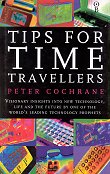Peter Cochrane states it thus: My job, my life, and my mission is to live in the future, to be a pathfinder, at least 5 years ahead of any other human, and 10 years ahead of most. He not only looks into the future, he tries to exploit existing technology to the hilt. This book is a collection of his musings on all things high-tech, about where we might be heading on that kind of timescale.
Well, since I'm reviewing it about 5 years after is was published (and so a little longer still after it first appeared as a newspaper column), and since I'm a fairly early adopter of some of the technology he's on about, most of what he talks about should now be fairly common place to me. Is that so?
For the most part, yes. The constantly increasing comms bandwidth, memory sizes and speeds, being outpaced by the yet faster increasing bloat of software, continues apace. His hopes for Java solving the problem of bloatware by having big user applications like word processors where you download only the applets of interest (if you never use footnotes, or indexing, say, you don't download that functionality) hasn't arrived, and some of the more powerful AI, AL and VR applications are still on the horizon (aren't they always?)
He is also an incredibly busy person (I feel tired just reading about his itinery), and never has time to read more than bite-sized chunks. So he has structured this book in similar sized chunks for the convenience of other ultra-busy people -- each mini-essay is only two pages long, allowing it to be read easily during one of those short gaps that often occur when travelling. [Although personally, I must say that I've found that, when travelling, having several long books is usually more appropriate, especially while sitting in what airports fondly refer to as departure lounges. At least train stations have the honesty to call them waiting rooms.] But since I read this in only three chunks, rather than the 60-odd it is cut into, I noticed some repetition.
Given the ultra-short essay length, it is consequently hard for him to develop a deep argument about anything. It's all sound-bites and slick presentation. For example, one of the essays is about how he throws all his email in a heap, and then uses a search program to find what he wants, rather than try to organise it. (It's analogous to the newly observed habit of doing Web searches to re-find interesting sites, in preference to keeping big files of bookmarks to them, again because it's easier.) This is an insightful point, and raises interesting questions: how does having brute force capabilities change the way we work, and how much of our organisational structures are there to compensate for lack of this capability in the past? But in such a short essay, there is no time to develop this, or any other, theme.
What is here is good, but it is rather like eating a meal composed entirely of appetizers and no main course, no matter how well-prepared and how well-presented -- it left me feeling simultaneously overstimulated and unsatisfied. Frankly, if this kind of future means never being able to sit and read for more than 5 minutes at a time, then I'm off to carve myself a different future.
